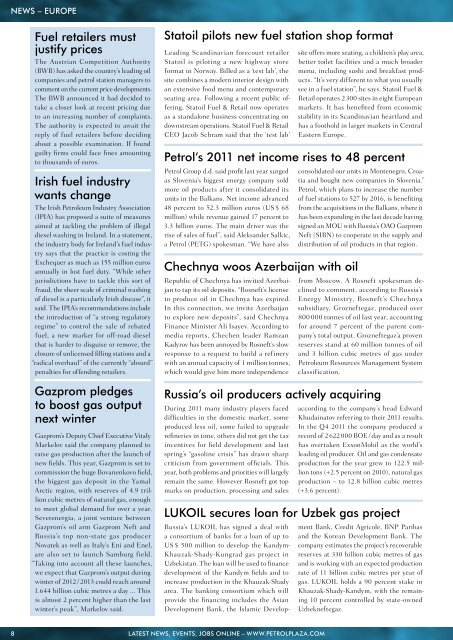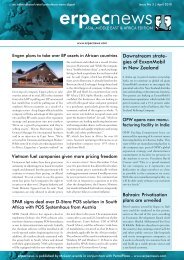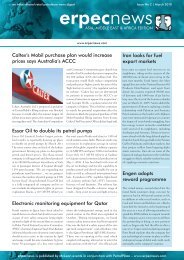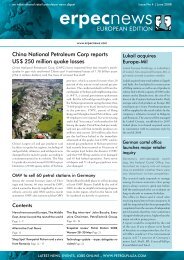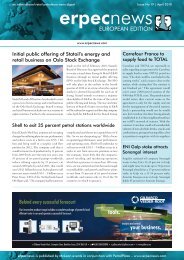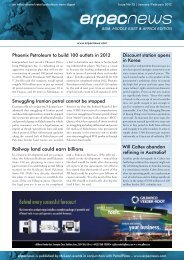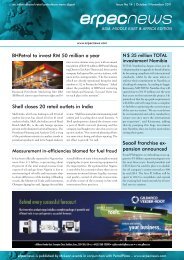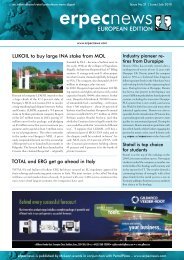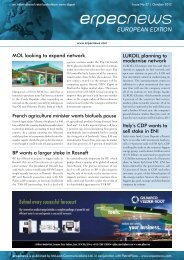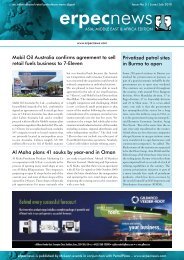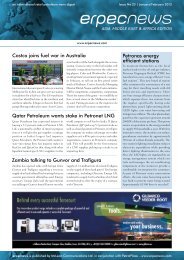Tanzania Oil companies want fuel testing Galp wants ... - ErpecNews
Tanzania Oil companies want fuel testing Galp wants ... - ErpecNews
Tanzania Oil companies want fuel testing Galp wants ... - ErpecNews
You also want an ePaper? Increase the reach of your titles
YUMPU automatically turns print PDFs into web optimized ePapers that Google loves.
News – eUrOPe<br />
8<br />
Fuel retailers must<br />
justify prices<br />
The Austrian Competition Authority<br />
(BWB) has asked the country’s leading oil<br />
<strong>companies</strong> and petrol station managers to<br />
comment on the current price developments.<br />
The BWB announced it had decided to<br />
take a closer look at recent pricing due<br />
to an increasing number of complaints.<br />
The authority is expected to await the<br />
reply of <strong>fuel</strong> retailers before deciding<br />
about a possible examination. If found<br />
guilty firms could face fines amounting<br />
to thousands of euros.<br />
Irish <strong>fuel</strong> industry<br />
<strong>want</strong>s change<br />
The Irish Petroleum Industry Association<br />
(IPIA) has proposed a suite of measures<br />
aimed at tackling the problem of illegal<br />
diesel washing in Ireland. In a statement,<br />
the industry body for Ireland’s <strong>fuel</strong> industry<br />
says that the practice is costing the<br />
Exchequer as much as 155 million euros<br />
annually in lost <strong>fuel</strong> duty. “While other<br />
jurisdictions have to tackle this sort of<br />
fraud, the sheer scale of criminal washing<br />
of diesel is a particularly Irish disease”, it<br />
said. The IPIA’s recommendations include<br />
the introduction of “a strong regulatory<br />
regime” to control the sale of rebated<br />
<strong>fuel</strong>, a new marker for off-road diesel<br />
that is harder to disguise or remove, the<br />
closure of unlicensed filling stations and a<br />
“radical overhaul” of the currently “absurd”<br />
penalties for offending retailers.<br />
Gazprom pledges<br />
to boost gas output<br />
next winter<br />
Gazprom’s Deputy Chief Executive Vitaly<br />
Markelov said the company planned to<br />
raise gas production after the launch of<br />
new fields. This year, Gazprom is set to<br />
commission the huge Bovanenkovo field,<br />
the biggest gas deposit in the Yamal<br />
Arctic region, with reserves of 4.9 trillion<br />
cubic metres of natural gas, enough<br />
to meet global demand for over a year.<br />
Severenergia, a joint venture between<br />
Gazprom’s oil arm Gazprom Neft and<br />
Russia’s top non-state gas producer<br />
Novatek as well as Italy’s Eni and Enel,<br />
are also set to launch Samburg field.<br />
“Taking into account all these launches,<br />
we expect that Gazprom’s output during<br />
winter of 2012 / 2013 could reach around<br />
1.644 billion cubic metres a day ... This<br />
is almost 2 percent higher than the last<br />
winter’s peak”, Markelov said.<br />
statoil pilots new <strong>fuel</strong> station shop format<br />
Leading Scandinavian forecourt retailer<br />
Statoil is piloting a new highway store<br />
format in Norway. Billed as a ‘test lab’, the<br />
site combines a modern interior design with<br />
an extensive food menu and contemporary<br />
seating area. Following a recent public offering,<br />
Statoil Fuel & Retail now operates<br />
as a standalone business concentrating on<br />
downstream operations. Statoil Fuel & Retail<br />
CEO Jacob Schram said that the ‘test lab’<br />
LATesT News, eveNTs, jOBs ONLINe – www.PeTrOLPLAzA.COM<br />
site offers more seating, a children’s play area,<br />
better toilet facilities and a much broader<br />
menu, including sushi and breakfast products.<br />
“It’s very different to what you usually<br />
see in a <strong>fuel</strong> station”, he says. Statoil Fuel &<br />
Retail operates 2 300 sites in eight European<br />
markets. It has benefited from economic<br />
stability in its Scandinavian heartland and<br />
has a foothold in larger markets in Central<br />
Eastern Europe.<br />
Petrol’s 2011 net income rises to 48 percent<br />
Petrol Group d.d. said profit last year surged<br />
as Slovenia’s biggest energy company sold<br />
more oil products after it consolidated its<br />
units in the Balkans. Net income advanced<br />
48 percent to 52.3 million euros (US $ 68<br />
million) while revenue gained 17 percent to<br />
3.3 billion euros. The main driver was the<br />
rise of sales of <strong>fuel</strong>”, said Aleksander Salkic,<br />
a Petrol (PETG) spokesman. “We have also<br />
Chechnya woos Azerbaijan with oil<br />
Republic of Chechnya has invited Azerbaijan<br />
to tap its oil deposits. “Rosneft’s license<br />
to produce oil in Chechnya has expired.<br />
In this connection, we invite Azerbaijan<br />
to explore new deposits”, said Chechnya<br />
Finance Minister Ali Isayev. According to<br />
media reports, Chechen leader Ramzan<br />
Kadyrov has been annoyed by Rosneft’s slow<br />
response to a request to build a refinery<br />
with an annual capacity of 1 million tonnes,<br />
which would give him more independence<br />
consolidated our units in Montenegro, Croatia<br />
and bought new <strong>companies</strong> in Slovenia.”<br />
Petrol, which plans to increase the number<br />
of <strong>fuel</strong> stations to 527 by 2016, is benefiting<br />
from the acquisitions in the Balkans, where it<br />
has been expanding in the last decade having<br />
signed an MOU with Russia’s OAO Gazprom<br />
Neft (SIBN) to cooperate in the supply and<br />
distribution of oil products in that region.<br />
from Moscow. A Rosneft spokesman declined<br />
to comment. according to Russia’s<br />
Energy Ministry, Rosneft’s Chechnya<br />
subsidiary, Grozneftegaz, produced over<br />
800 000 tonnes of oil last year, accounting<br />
for around 7 percent of the parent company’s<br />
total output. Grozneftegaz’a proven<br />
reserves stand at 60 million tonnes of oil<br />
and 3 billion cubic metres of gas under<br />
Petroleum Resources Management System<br />
classification.<br />
russia’s oil producers actively acquiring<br />
During 2011 many industry players faced<br />
difficulties in the domestic market, some<br />
produced less oil, some failed to upgrade<br />
refineries in time, others did not get the tax<br />
incentives for field development and last<br />
spring’s “gasoline crisis” has drawn sharp<br />
criticism from government officials. This<br />
year, both problems and priorities will largely<br />
remain the same. However Rosneft got top<br />
marks on production, processing and sales<br />
according to the company’s head Edward<br />
Khudainatov referring to their 2011 results.<br />
In the Q4 2011 the company produced a<br />
record of 2 622 000 BOE / day and as a result<br />
has overtaken ExxonMobil as the world’s<br />
leading oil producer. <strong>Oil</strong> and gas condensate<br />
production for the year grew to 122.5 million<br />
tons (+2.5 percent on 2010), natural gas<br />
production – to 12.8 billion cubic metres<br />
(+3.6 percent).<br />
LUKOIL secures loan for Uzbek gas project<br />
Russia’s LUKOIL has signed a deal with<br />
a consortium of banks for a loan of up to<br />
US $ 500 million to develop the Kandym-<br />
Khauzak-Shady-Kungrad gas project in<br />
Uzbekistan. The loan will be used to finance<br />
development of the Kandym fields and to<br />
increase production in the Khauzak-Shady<br />
area. The banking consortium which will<br />
provide the financing includes the Asian<br />
Development Bank, the Islamic Develop-<br />
ment Bank, Credit Agricole, BNP Paribas<br />
and the Korean Development Bank. The<br />
company estimates the project’s recoverable<br />
reserves at 330 billion cubic metres of gas<br />
and is working with an expected production<br />
rate of 11 billion cubic metres per year of<br />
gas. LUKOIL holds a 90 percent stake in<br />
Khauzak-Shady-Kandym, with the remaining<br />
10 percent controlled by state-owned<br />
Uzbekneftegaz.


